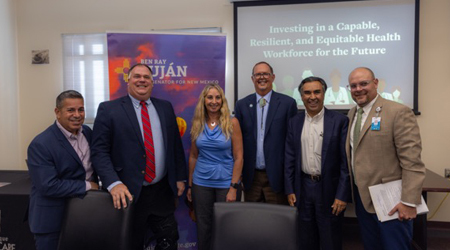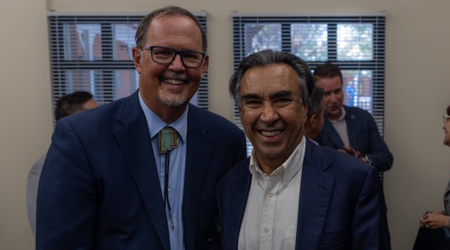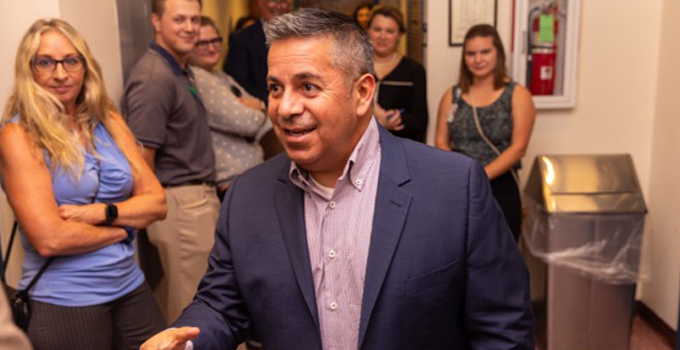In a town hall, health and health science leaders from The University of New Mexico and around the state provided answers for Sen. Ben Ray Luján, (D) New Mexico, regarding the causes and possible solutions to New Mexico’s challenges in growing and maintaining a vibrant health care workforce. They shared on ways to enhance federal partnerships that could help, including bringing more resources to New Mexico to serve as an incubator for new innovations.
 The town hall was part of Luján’s series of community discussions around the state listening to different stakeholders’ perspectives on health care issues. At this town hall, hosted by Albuquerque Health Care for the Homeless, Doug Ziedonis, MD, MPH, CEO of the UNM Health System and Executive Vice President of UNM Health Sciences, joined Sanjeev Arora, MD, founder and director of UNM’s Project ECHO; Angela Ramirez, deputy chief of staff to U.S. Health and Human Services Secretary Xavier Becerra; Gloria Doherty, PhD, PPA, MSN, RN, Adult Nurse Specialist, ACNO-BC, FAANP, New Mexico Nurses Association; Andres Gensini, MD, FAAFP, vice president of clinical affairs for Presbyterian Medical Services; and Troy Clark, president/CEO of the New Mexico Hospital Association.
The town hall was part of Luján’s series of community discussions around the state listening to different stakeholders’ perspectives on health care issues. At this town hall, hosted by Albuquerque Health Care for the Homeless, Doug Ziedonis, MD, MPH, CEO of the UNM Health System and Executive Vice President of UNM Health Sciences, joined Sanjeev Arora, MD, founder and director of UNM’s Project ECHO; Angela Ramirez, deputy chief of staff to U.S. Health and Human Services Secretary Xavier Becerra; Gloria Doherty, PhD, PPA, MSN, RN, Adult Nurse Specialist, ACNO-BC, FAANP, New Mexico Nurses Association; Andres Gensini, MD, FAAFP, vice president of clinical affairs for Presbyterian Medical Services; and Troy Clark, president/CEO of the New Mexico Hospital Association.
Luján began the discussion by explaining that health care issues are personal issues, reminding the audience of a stroke he suffered a year and a half ago where he received care at UNM Hospital.
“While I was at UNM Hospital receiving excellent care, I made friends with the nurses, doctors, and teams caring for me,” Luján said. “If you really want to know what’s going on inside, talk to the person who cleans the building!”
Expressing his sincerity and gratitude for all health care workers, Luján opened the discussion to hear about New Mexico’s health care workforce challenges. Doherty explained that our state needs more than 5,000 nurses to fill the shortage in every county. Troy stated urban hospitals are overcapacity and rural hospitals are under capacity as a result of rural hospitals not having basic service lines, forcing the smaller hospitals to send patients to Albuquerque.
“We have a health care workforce crisis,” Ramirez stated.
Project ECHO, a nonprofit organization, has been working to address the shortage of specialists through its virtual mentoring model, helping frontline health care professionals learn, and stay current, with best-practice care, wherever they live.

“Our vision is that all health care professionals have ongoing mentorship across their lifespan. With the rapid evolution and growth of the health care knowledge base, it’s increasingly difficult for health care providers to keep up, particularly those who serve the underserved, which widens health disparities,” said Arora. “Since 2003, ECHO has been making a positive impact in the fields of pediatric mental health, diabetes, autism and many others. ”
Ziedonis explained many UNM health sciences graduates stay in New Mexico and are the majority of our state’s health care workforce citing recent statistics that show about 50 percent of UNM’s medical doctor graduates practice in New Mexico, 70 percent of College of Nursing graduates stay in state, 80 percent of pharmacy graduates practice in state, and about 90 percent of health professions graduates remain in New Mexico.
He stated, “we grow our own through tremendous pathways programs starting in elementary schools. We want equity in our workforce, as well as capability and resilience.”
Ziedonis explained UNM’s mission to enhance health and health equity through all mission areas. Examples he shared include how Project ECHO’s telementoring training of our state’s health workforce is disseminating the latest health care approaches through case discussions, which is saving lives. Ziedonis cited UNM’s Office of Community Health, which created a national best practices model, the Health Extension Rural Offices (HEROs) that support system change and integrate community health worker into every New Mexico county. The community health workers are working in local communities to help residents connect with social services, health care, and many other needed services to address the barriers that are preventing them from accessing health care. Additionally, he told Luján and the panel that UNM’s providers, faculty, staff, and researchers are world class and have enormous dedication to their missions. He explained how UNM’s best practices to scale up programs in New Mexico and nationally, but we need more collaboration and support from Congress and the Biden Administration to assist.
“We need a public health strategy. We need a health equity strategy. We need to focus on social determinants of health adverse childhood events,” Ziedonis said to Luján. “How are we going to help a wide range of folks address these issues?”
Some ideas Ziedonis presented include:
- Expanding efforts to create more broadband so that health care systems can offer more telehealth, teleconsult, and telementoring options.
- Creating more education loan forgiveness programs, especially for rural and Tribal providers, to incentivize working in these locations. This would also allow providers focus on their patients without worrying about crippling debt.
- Assist public and academic hospitals to compensate health care workers at wages competitive to private or for-profit hospitals.
- Provide resources to the Indian Health Services (IHS) to support Graduate Medical Education trainees (residents/fellows) and other health care worker trainees similar to the VA Health System. This would allow trainees to learn within the IHS and Native American communities and encourage them to make a career serving these populations.
- Assist universities’ compensation for health sciences faculty and researchers. With increased faculty, UNM could grow all health sciences academic units, allowing us to accept, educate, and train a greater number of health care professionals. Assistance in compensation would also assist efforts to recruit and retain the best and brightest.
- Support a national effort to increase clinical faculty and preceptors using the Project ECHO platform and stipend support to increase our capacity for faculty and add more students in more clinical placements.
- Reexamine Medicaid and Medicare reimbursements to assist hospitals balance budgets. Troy stated 67 of New Mexico’s hospitals have unbalanced budget sheets. Additionally, Ziedonis stated 43 percent of New Mexicans are on Medicaid and more than half use Medicare.
“Let's flesh this out, let’s develop this,” Luján stated. “If it's here, how can we move forward? The best legislative ideas come from talking to people right now, whether it's in a roundtable like today or at a grocery store. I will look at incorporating (these ideas) in existing legislation, or author something new and advocate within the agencies like Health and Human Services.”
After the panel discussion, Ziedonis and the other health care leaders expressed gratitude for Luján’s and other federal representatives’ engagement.
“I'm excited that we're here working together because I think that's the only way this is going to be addressed,” Ziedonis said.
